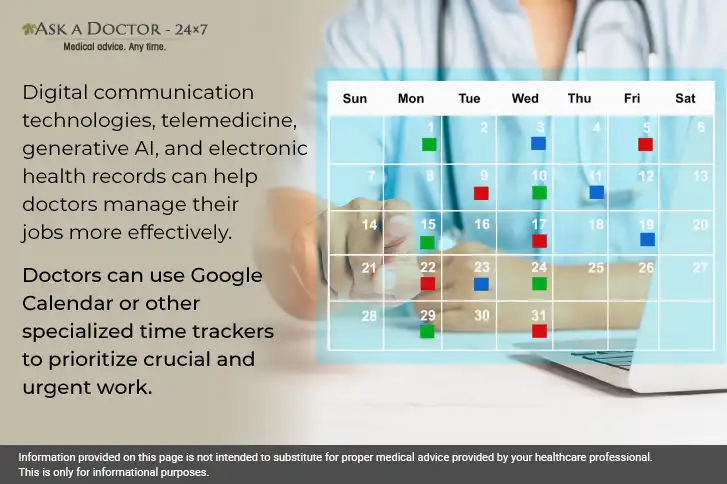5 Self-Care Steps That Doctors Must Follow To Have A Balance Work And Life
Achieving work-life balance for doctors is important for their general job satisfaction, improved patient care, less burnout, and personal happiness and health.
Doctors dedicate their lives to caring for others. However, due to the demanding nature of their work, they put their own well-being last and frequently find it difficult to strike a balance between their personal and professional obligations. In this article, we have discussed why setting clear boundaries between work and personal life is crucial for maintaining a healthy balance and have also pinned a time-saving checklist of recommended practices for achieving this balance in one's life.
Work-Life Balance Best Practices For Doctors

Some self-care tips that can help our healers stay in good physical, mental, and emotional health despite the rigorous duties of their line of work, are as follows:
1) Create a Schedule for Time Management
For medical professionals to successfully manage their time and strike a healthy work-life balance, they must create a well-structured calendar. Given the demanding and frequently unpredictable nature of their line of work, effective job planning and prioritization are essential. Healthcare workers can more effectively manage their time and energy by creating a calendar that includes specific time slots for work, personal obligations, and self-care. This entails avoiding overcommitting and having reasonable expectations. Doctors and other medical professionals may make sure they get enough sleep, take care of themselves, and spend time with their loved ones by planning ahead. Additionally, it allows you to maximize their output during working hours, reducing the need for needless overtime or invading personal space.
2) Make Time for Exercise and Physical Activity
It can be difficult to find time for regular exercise when you're a doctor, but it's crucial for your health. To stay active, think about implementing quick exercises like 10-minute walks during your breaks or getting a walk pad for your workplace. Include meditation and yoga in your schedule twice or three times a week to improve your general vitality, and mental health, reduce stress, and preserve cardiovascular health. Engaging in these activities will not only keep you healthy but also mentally and physically prepared to take on your hard job.
3) The Right Diet for Long-Term Energy
Making healthy nutrition a priority is essential for long shifts because they demand continuous energy. To power your morning rounds, start your day with a high-protein meal that is packed with nutrients. Then, pack nutrient-dense snacks to satiate your appetites during your shift. By packing wholesome snacks like fruits and nuts, you may avoid relying on junk food and keep your energy levels up during lengthy shifts. Make time for nutritious meals despite your busy schedule to prioritize your health so that you can maintain your personal well-being and have the energy and attention necessary to give your patients the best care possible.
4) Adequate Rest Period and High-Quality Sleep
Due to your busy schedule, as a doctor, you might be ignoring the quality of your sleep. However, doctors must get enough good sleep to stay mentally clear and give their patients the best care possible. Eating foods that sustain energy levels can facilitate the development of deeper sleep stages. Sleep can also be facilitated by cutting back on caffeine and giving up smoking. Reducing the amount of time spent on electronics before bed can promote higher-quality sleep.
5) Establish a Helpful Professional Network
A strong professional network among doctors not only provides a feeling of camaraderie and companionship but also provides assistance and information exchange. To create and keep up this network, make sure to:
- Attend regional and national medical conferences to network with colleagues and share ideas.
- Take part in interest groups or committees at the hospital or in your specialty to meet colleagues who share your interests.
- Make use of professional platforms and social media such as LinkedIn and forums dedicated to a particular specialty, which can be a great resource for knowledge sharing about the latest in your fields and case discussions.
Thus, a healthy personal and professional life for a doctor depends on creating a well-structured schedule, including proper stress management, exercise, food, and rest in your daily regime. Healthcare professionals can refuel and reclaim their sense of balance by scheduling some time for relaxation, recreational pursuits, and meaningful time with loved ones. Never forget that caring for yourself comes before caring for others.
If you have any questions about maintaining a work-life balance, you can check with our team of doctors at Ask a Doctor, 24x7.
Recently Answered Question-Related to Doctors and Mental Health
Disclaimer: Information provided on this page is not intended to substitute for proper medical advice provided by your healthcare professional. This is only for informational purposes.
Ask a Specialist
Recent Questions


